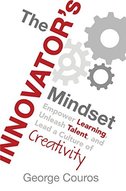| I've just started reading George Couros' The Innovator's Mindset. The introduction alone is full of richness. The forward to the book was written by Dave Burgess. He says: Buzzwords crowd the educational reform movement like buzzards circling a decaying carcass. Many have become enamored with - and lost to - a culture of clichés and a penchant for platitudes...[A] true spirit of innovation is exactly what our educational system needs to crush complacency, stomp the status quo, and forge a path into the future that is perpetually in flux. Those aren't just platitudes. There are truths in Burgess' words. He continues: |
If reading this book makes you uncomfortable, fantastic!
If reading it forces you to question long-held and dear beliefs, wonderful!
But, if you read this book and it does nothing to change your practice, we failed. Inspiration without implementation is a waste...As [the author] so eloquently says, "Change is an opportunity to do something amazing."
Author George Couros' own introduction to the book is hard to put down. If the rest of the book is as chock-full of wisdom as the intro, this book will be a valuable addition to a teacher's professional library. Something as simple as a new, positive outlook on our changing educational world resonate:
Change is an opportunity to do something amazing.
Inspiration is one of the chief needs of today's students. Kids walk into schools full of wonder and questions, yet we often ask them to hold their questions for later, so we can "get through" the curriculum. We forget that our responsibility isn't solely to teach memorization or the mechanics of a task but to spark a curiosity that empowers students to learn on their own.
To wonder.
To explore.
To become leaders.
We forget that if students leave school less curious than when they started, we have failed them...
When students graduate, many of them are good at one thing: school...[A]lthough we say we want kids to think for themselves, what we teach them is compliance...
Compliance does not foster innovation. In fact, demanding conformity does quite the opposite.
As for me, I see great value in not providing answers, or even questions, for my class. It might be a difficult proposition, this giving up of time to empower students, this nurturing of a problem solving garden without removing all the weeds, but it does foster curiosity and creativity. I'm convinced there are many teachers who dream, like me, of offering that kind of an atmosphere. We all seem to realize this much:
Twenty-first century education is not about the test; it's about something bigger.
My focus is not on whether can knock it out of the park on some science test in grade three. What I care about is that kids are inspired to be better people because of their experiences in my school.
These teachers want to be innovative, but, instead of connecting and learning from others around the world, let alone with colleagues in their own schools, they spend their time in staff meetings that often seem irrelevant to the heart of teaching. They are constantly told that if they want to be innovative, they are going to have to find time to do it.
As leaders, if we ask teachers to use their own time to do anything, what we're really telling them is: it's not important. The focus on compliance and implementation of programs in much of today's professional development does not inspire teachers to be creative, nor does it foster a culture of innovation. Instead, it forces inspired educators to color outside the lines, and even break the rules, to create relevant opportunities for their students...The results surprise us. Their students remember them as "great teachers," not because of the test scores they received but because their lives were touched.








































